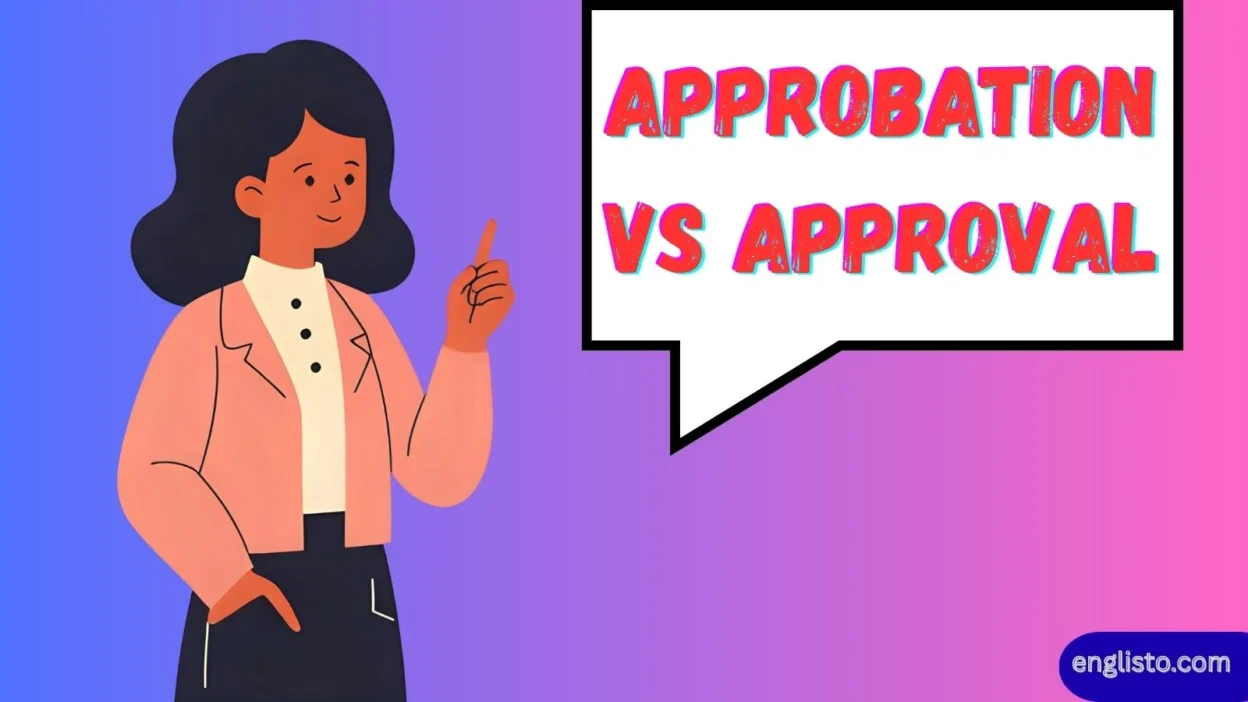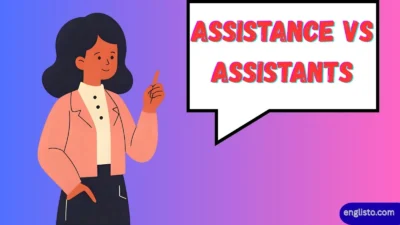Language is full of words that seem like twins but carry nuances that make them unique. Two such words are “approbation” and “approval.” At first glance, they appear to mean the same thing—both signal a form of acceptance, praise, or positive judgment. Yet when we dig deeper into history, formality, everyday usage, and context, their meanings begin to separate in fascinating ways. Approbation vs Approval.
In this article, we’ll break down the origins, usage patterns, emotional tone, grammatical roles, and practical applications of approbation vs approval. Whether you’re a student, professional writer, or someone simply curious about the quirks of English vocabulary, this guide will give you a clearer grasp of the distinctions.
What Do “Approbation” and “Approval” Mean?
At their core, both words signal a positive judgment, validation, or endorsement. But there’s a key difference in how they’re perceived in modern English.
| Term | Core Meaning | Tone | Frequency | Common Contexts |
| Approbation | Formal praise, admiration, or commendation | Elevated, literary, solemn | Rare, mostly academic or older texts | Speeches, official recognition, historic documents |
| Approval | Permission, consent, agreement, or acceptance | Neutral to positive, broad | Very common, daily conversations and business | Everyday life, legal contexts, workplace, friendships |
Approbation is often linked to praise and admiration—for example, a critic showing approbation for an artist’s exhibition.- Approval is more versatile: you approve a vacation request, a policy, or even your friend’s new haircut.
In other words, approbation is higher-level and rarer, while approval is practical and universal.
Read More: Favor or Favour: The Guide to Understanding the Spelling, Usage, and Meaning
Historical Roots and Evolution
The difference begins with their etymology:
- Approbation comes from the Latin approbare (“to prove, to show to be worthy”). It entered English in the 16th century, reaching peak popularity in the 19th century, especially in speeches and literature. Writers in the 1800s used it to give weight and flair to expressions of admiration.
- Approval also comes from approbare, but shifted toward meanings of permission, agreement, and consent as English evolved. From the 1700s onward, it became the everyday term we know today.
By the late 1800s, approbation began to decline in usage, while approval rose steadily. Today, approbation survives mostly in academic, legal, or ceremonial contexts.
Emotional Tone and Register
The choice between these two words depends heavily on tone, audience, and emotional weight.
| Feature | Approbation | Approval |
| Emotional strength | Strong admiration, often enthusiastic | Ranges from neutral agreement to positive support |
| Register | Formal, literary, high-level speeches | Casual, professional, legal, everyday |
| Polarity | Almost always positive | Can be positive, neutral, or even reluctant |
| Psychological impact | Feels like deep respect or honor | Feels like validation, permission, or agreement |
If a mayor waves in approbation at a new community project, it signals public praise.- If the city council gives approval, it means the project is legally permitted.
The distinction is both emotional and pragmatic.
Practical Usage Examples
Let’s see how both words behave in sentences:
- Approbation
- The artist received the approbation of critics at the exhibition.
- Lincoln’s Emancipation Proclamation was met with widespread approbation among abolitionists.
- The artist received the approbation of critics at the exhibition.
- Approval
- The manager gave her approval for the vacation request.
- The FDA has not yet granted approval for the new drug.
- The manager gave her approval for the vacation request.
Notice how approbation leans toward admiration and approval toward permission or agreement.
Synonyms and Subtle Variations
Both words share synonyms but differ in connotation and intensity.
| Approbation Synonyms | Approval Synonyms |
| Commendation | Permission |
| Praise | Agreement |
| Admiration | Consent |
| Acclaim | Endorsement |
| Recognition (formal) | Acceptance |
Think of approbation as a standing ovation and approval as a nod of agreement.
Approbation vs Approval in Formality and Institutions
Approbation shows up in:
- Ceremonial speeches: The Nobel committee expressed its approbation for the scientist’s groundbreaking research.
- Older texts and literature: 19th-century writers often leaned on this term to add gravitas.
- Academic papers: Sometimes used when discussing public admiration, cultural acceptance, or moral judgment.
Approval dominates in:
- Legal settings: Court settlements, contracts, visa permissions, FDA drug approvals.
- Workplace interactions: Managerial consent, company endorsements, project greenlights.
- Everyday speech: Saying “I don’t approve of this behavior” is natural, while “I don’t approbate this behavior” would sound odd.
Semantic Nuances: Parsing the Differences
From a linguistic and computational perspective, the two words map differently across corpora.
- Approbation appears mostly in historical, literary, and ceremonial registers. Its frequency in modern English is limited, giving it a touch of sophistication.
- Approval occurs across broad domains—business, law, friendships, institutions, politics. It has a high usage frequency and is the go-to word in discourse.
This polarity shows how English evolved to keep one term broad and practical while letting the other remain specialized and formal.
Real-Life Scenarios
- Personal Life:
- You seek your parents’ approval for borrowing the car.
- You earn your mentor’s approbation after presenting a brilliant project.
- You seek your parents’ approval for borrowing the car.
- Professional Settings:
- A company needs approval from a regulatory board before launching a product.
- A CEO might receive approbation from industry peers after years of successful leadership.
- A company needs approval from a regulatory board before launching a product.
- Cultural & Historical:
- A film director may win approbation at the Cannes Film Festival.
- A government policy needs parliamentary approval before implementation.
- A film director may win approbation at the Cannes Film Festival.
Choosing the Right Word
When deciding which to use, ask:
- Is the situation formal, ceremonial, or literary? → Use Approbation.
- Is it about permission, consent, or general agreement? → Use Approval.
- Do you want to sound sophisticated or simply clear? → Pick accordingly.
Rule of Thumb:
- Approval = practical, everyday.
- Approbation = elevated, praise-driven.
Conclusion
Both approbation and approval express positive judgment, validation, and respect, but they occupy different places in English. Approval is the workhorse—common, versatile, and used in legal, personal, and professional settings. Approbation is the show horse—formal, literary, and powerful when you want to express deep admiration.
By learning the nuances, you’ll communicate with greater precision, sophistication, and confidence.
FAQs
1. Is approbation just an old-fashioned word for approval?
Not exactly. While approbation has declined in everyday use, it still carries a distinct meaning of praise and admiration that approval doesn’t always capture.
2. Can approbation mean permission like approval does?
No. Approbation rarely means permission. It’s more about commendation than agreement.
3. Why do we see approval everywhere but not approbation?
Because approval shifted into practical domains like business, law, and daily life, while approbation stayed literary and ceremonial.
4. Which sounds more formal—approval or approbation?
Definitely approbation. It signals formality, depth, and respect, while approval works in both casual and formal contexts.
5. Should English learners bother with approbation?
Yes, but carefully. Use it when you want to sound formal or sophisticated—for example, in essays, speeches, or writing that calls for a higher register.



